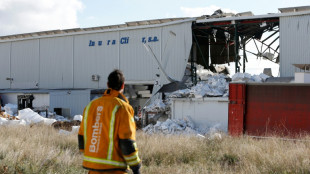

Shouts, fights, vomit: Polish city grapples with drunk tourists
Late evening, downtown Krakow goes from historic landmark to hub for stag nights, pub crawls and wild parties. Now, fed up with the ruckus, disgruntled locals are taking Poland's second city to court.
The lawsuit filed this month, with backing from several dozen residents, accuses municipal authorities of not doing enough to address disturbances to public order, including loud noise and excessive drunkenness.
"Non-compliance with the law has become a symbol of tourism in Krakow," Ryszard Rydiger, the lawyer behind the initiative, told AFP.
He likened the situation to something seen "nowhere else in Europe" and said tourists were behaving like "Tarzan from the Jungle" without consequence.
This is not the first time that Krakow -- visited by a whopping 9.4 million tourists in 2023, according to city estimates -- has grappled with challenges posed by its more unruly visitors.
Last year, there were 6,800 police interventions in the city centre, many of them for drinking alcohol and destroying public property. Two-thirds resulted in fines, according to municipal police spokesman Marek Aniol.
- 'Heart of darkness' -
While the lawsuit alleges that public disturbance issues are endemic to the entire Old Town, residents name Szewska Street as the problem's epicentre.
"Every day of the week, until six in the morning, Szewska becomes a place of noisy gatherings," reads the suit.
"The crowd, without any restrictions or effective response from city authorities, sings... shouts, fights, vomits... The noise emitted by the drunken rabble exceeds the standards permitted by law."
The initiative was a good move, according to one resident, club promoter Jan, who called Szewska the "heart of darkness".
"The city should intervene in some way," the 23-year-old told AFP.
Noise and mess aside, Jan said that competition among clubs for higher numbers of late-night visitors also resulted in street fights.
He recounted the story of a friend who worked as a promoter on Szewska but had to quit due to the "heavy trauma" of violence from rivals.
Even beyond the dead centre, late-night debauchery can pose problems for locals.
"You can't walk peacefully in the evening, or at night," said Weronika, a 25-year-old doctor.
"The peace is very disturbed."
- 'City of Polish kings' -
Krakow has taken steps to address the issue.
Mayor Aleksander Miszalski announced this week the appointment of a night official, as well as plans for a committee that would research the situation and offer solutions.
Last July, the city became Poland's first to ban alcohol sales from midnight until 5:30 am, a move supported by more than half of residents.
Police said that in the first six months, interventions were down by half and fewer intoxicated people landed in sobering-up centres.
For the past three years, Krakow has also employed "City Helpers" during the high season -- night-time volunteers tasked with providing information to tourists and calling police if need be.
The municipality has also released numerous advertising campaigns geared towards bringing out-of-towners into line and reducing public disturbances.
"Of course we need tourists," said Jan. "It's just that there needs to be appropriate legislation so that we have the tourists, but without the noise, mess and crap."
What began as a public safety operation in 2021 later evolved into a targeted campaign against Britons, who are known for indulging in stag nights in Krakow.
While initial posters around the city urged both residents and visitors to respect others' space, be on "good behaviour" and "keep belongings safe", the latest campaign was much more blunt.
"You are in the city of Polish kings," the posters read. "This deserves respect."
Rydiger said these "actions go in the right direction" but are "completely initial" in terms of addressing the problem.
"For years, the tourism policy has been 'come, come, come', but it has not been about setting clear boundaries on what can and cannot be done," he said.
D.Wolf--MP




